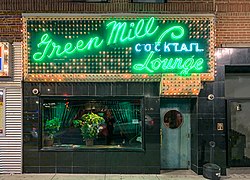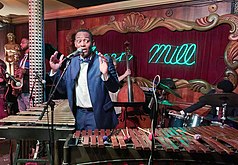Green Mill Cocktail Lounge
| Green Mill Cocktail Lounge | |
|---|---|
 | |
 | |
| General information | |
| Address | 4802 N. Broadway |
| Coordinates | 41°58′09″N 87°39′36″W / 41.9692°N 87.6599°W |
The Green Mill Cocktail Lounge (or Green Mill Jazz Club) is an entertainment venue on Broadway in Uptown, Chicago. It is frequently mistaken for the earlier "Green Mill Gardens", which was known for its jazz performances, along with its connections to Chicago mob history. The information below conflates these two separate businesses and their locations. The current day Green Mill Lounge at 4802 W. Broadway first opened in 1935 in the space formerly occupied by a jewelry store named "Wolf's Jewel Shop."[1] Any references to pre-1935 events occurred at the Green Mill Gardens, which was located a few doors north of the current business.
The business is considered one of the most famous bars in the United States and the most iconic in Illinois.[2][3]
History
[edit]Originally named Pop Morse's Roadhouse, the business opened in 1907. The bar was purchased by Tom Chamales, a real estate developer and tavern owner, and was renamed Green Mill Gardens in 1910,[4] a nod to the famous Moulin Rouge ("Red Mill") of Paris.[5] In its early years, it was a popular hangout for movie actors from nearby Essanay Studios.[6] The namesake gardens were removed in the 1920s during the construction of the Uptown Theatre on the same block.[7]
During the Prohibition era, "Machine Gun" Jack McGurn of Al Capone's Chicago Outfit became a part-owner. Singer and comedian Joe E. Lewis was attacked by McGurn's men in 1927 after he refused to take his act to the Green Mill. Lewis' throat was slashed, but he survived. The incident inspired the 1957 film The Joker Is Wild.[6]
It is alleged that Al Capone's favorite booth is still in the establishment, located directly west of the short end of the bar. However, the current-day Green Mill did not exist at that site until 1935, several years after Capone went to prison, leaving Chicago for good.
It is also alleged that, during Prohibition, patrons of Green Mill Gardens could escape through a series of coal tunnels that run under the entire block, which also connect to the present day Green Mill jazz club through a trap door behind the bar.[8]
After the end of Prohibition, the Green Mill became a more reputable establishment, attracting many popular jazz acts including Louis Armstrong, Billie Holiday and Al Jolson, along with cabaret icons like Texas Guinan: a onetime rodeo rider and vaudeville performer, Guinan reinvented herself during Prohibition as a bawdy, breezy master of ceremonies for cabaret shows at spots like the 300 Club in New York before coming to Chicago for a brief period from 1928 to 1930.[4][9]
The business began to struggle following World War II. In 1940, the Green Mill was purchased by the Batsis brothers, who sold it in 1960 to Steve Brend. Brend had worked for Jack McGurn as a youngster and was called the "Mayor of Uptown" for his gregarious nature and proclivity for storytelling. During that period, the Green Mill went from a nightlife hub to a place where day drinking and drug use were the norm, but was purchased and revitalized in 1986 by Dave Jemilo, a south-sider and owner of the bar Deja Vu.[4][6]
On Sunday nights, the Green Mill became home to the Uptown Poetry Slam, the longest-running poetry slam in the country.[10]
Chicago-based comic Whitney Chitwood recorded her 2019 album The Bakery Case live at the Green Mill; the album reached No. 9 on the Billboard comedy chart[11] and was the first comedy album to be recorded at the club.[12]
Recently the Green Mill hosts performers ranging from jazz quartets to swing orchestras who frequently play to a packed house.[13] During quieter performances, staff may ask patrons to put their phones away and refrain from loud talking.[13] Behind the bar stands a small table with a shrine to Al Capone as a tribute to the earlier days.[13]
In popular culture
[edit]Over the years, the Green Mill has appeared in many films, such as Thief (1981), Next of Kin (1989), V. I. Warshawski (1991), Prelude to a Kiss (1992), Folks! (1992), A Family Thing (1996), Soul Food (1997), High Fidelity (2000), The Lake House (2006), The Dilemma (2011) and Chicago Overcoat (2010).
In the Star Trek Voyager episode "Course: Oblivion" the Green Mill is mentioned by the character Tom Paris as a "Genuine speakeasy". In the Chicago PD episode "We Don't Work Together Anymore" main characters Voight and Olinski enter the Green Mill to question a man. When they 1st enter, they tell the guy he must think he's a big shot because he's hanging out in "Al Capone's old joint."
References
[edit]- ^ Loerzel, Robert (March 31, 2023). "Piecing Together the Green Mill Puzzle: Updated – ROBERT LOERZEL". Retrieved July 28, 2024.
- ^ "10 of the Most Famous Bars in the US". April 21, 2020.
- ^ "The Most Iconic Bar in Every State (And DC)". April 8, 2015.
- ^ a b c Sisson, Patrick (March 20, 2014). "An oral history of the Green Mill". Chicago Reader. Retrieved September 25, 2019.
- ^ Randolph H. Hudson and Jan Pinkerton. Encyclopedia of the Chicago Literary Renaissance. Infobase Publishing, 2004. 146.
- ^ a b c Arnie Bernstein. Hollywood on Lake Michigan. Lake Claremont Press, 1998. 227-230.
- ^ Harold Henderson. "Uptown History". Chicago Reader. March 30, 2007. Retrieved on March 15, 2012.
- ^ "Under Uptown: The Tunnels Under Broadway That Carried Coal, Capone and More". DNAinfo Chicago. Retrieved July 28, 2024.
- ^ Sawyers, June (January 22, 1989). "WHOOPING IT UP, FOR A PRICE, WITH 'TEXAS' GUINAN". chicagotribune.com. Retrieved September 25, 2019.
- ^ "Uptown Poetry Slam turns 21 with bash". Chicago Sun-Times. July 20, 2007. NC27.
- ^ "Chart History: Whitney Chitwood". Billboard. Retrieved June 17, 2020.
- ^ "The 5: Whitney Chitwood's Top Five Queer Haircuts of All Time". The Interrobang. October 25, 2019. Retrieved June 17, 2020.
- ^ a b c Bernot, Kate (October 22, 2013). "The essentials: Green Mill". The Chicago Tribune. Archived from the original on November 1, 2019. Retrieved November 1, 2019.


